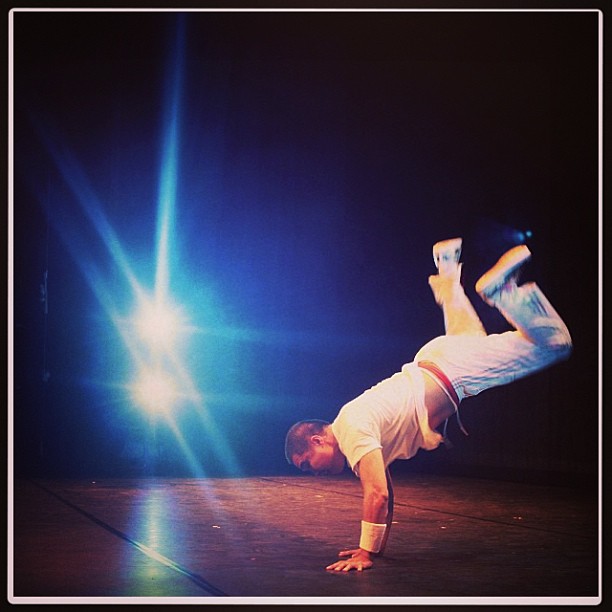 Kilusan Bautista looks as comfortable on stage as others would be in their living rooms. His voice rises up and down in rhythmic acrobatics: flipping sounds into the air, letting stories free fall, catching each word in his natural cadence. He presses the microphone to his lips so that each “p” sound punches the air.
Kilusan Bautista looks as comfortable on stage as others would be in their living rooms. His voice rises up and down in rhythmic acrobatics: flipping sounds into the air, letting stories free fall, catching each word in his natural cadence. He presses the microphone to his lips so that each “p” sound punches the air.
Deep down in my soul
I pray to the universe with my flow
I am a child of the wild metropolitan jungle.
This is the beginning of his one-man show Universal Self, an autobiographical theatrical performance combining his life experience with spoken word, dancing, martial arts, and hip-hop music. The production revolves around Kilusan’s struggles with identity as a Filipino-American at the intersection of two cultures, family issues, and in his words, “social justice.” The show is a coming-of-age story, set in the 1980s and 1990s of Kilusan’s native San Francisco. Using every inch of the stage, he break dances, lyrically moves, performs spoken word while doing Pilipino martial arts, and disappears into different characters.
“Theater to me is like my jacket. It allows me to bring everything together,” he said. He speaks fluidly and uninterrupted save for carefully chosen dramatic pauses. When presented the word “stability,” Kilusan takes time to chew on the word.
“What IS stability?" He then drifts off into the importance of education, talks about writing, and goes into anecdotes about his father, uncles, and friends for several minutes.
“Stability was not financial, not just having a roof over my head… For me, stability came from the arts.”
It’s possible Kilusan wouldn’t have become an artist without his dad's struggles. He grew up in a turbulent household with a drug-addicted father; 12-year-old Kilusan would sometimes tag along to attend Alcoholics Anonymous and Narcotics Anonymous meetings. He kept himself out of the house as much as possible, finding solace in break dancing, theater, and martial arts.

“[Art] revolutionized my whole identity, my expression, my voice, and as an adult and professional artist, my expression is full body. My identity has a lot to do with movement.” His name – Kilusan–means “movement” in tagalog. Originally born Jeremy Tagle Bautista, he changed it in 1999 after hearing it used by teachers and artists in the Philippines on a study abroad visit, doing research for what would eventually become “Universal Self.”
“I took up on that name as a constant reminder for myself that I’m not just an individual but I represent a larger history," the artist, a third generation Filipino-American, said.
At 16 years old, Kilusan left home, as he was fed up with his father’s drug abuse. Two tickets out of town hooked him: poetry and education. Through the Education Opportunity Program benefiting first-generation college students and minorities entering college, Kilusan enrolled in the University of California, Santa Cruz. A scholarship and housing offer convinced him to pursue higher education. To make money, he toured around the globe as part of the Bay Area-based spoken word collective, 8th Wonder.
After graduating from UC Santa Cruz, he took on a slew of community organizing roles, by reaching out to public schools through gang prevention group, United Playaz, in San Francisco and teaching Hip Hop courses around the Bay Area. He moved to New York in 2008. Currently, he’s a teaching artist with NYC’s Department of Education, working at Downtown Brooklyn Access GED and using parts of “Universal Self” as prompts for students to create their own works. Many of the students Kilusan works with share the same gang, drug, and violence-ridden surroundings he experienced while growing up. The mutual understanding allows him to connect with them easily.
“You have to ask the question: Why are the students sharing? Why do they want to be heard? Why do they want to connect and relate to others, you know?” Kilusan spit these questions with a steady rhythm.
“My answer to that is because we’re all still trying to understand who we are and reflect back on it This is a lifelong process.”
Universal Self is constantly shifting. Kilusan claims it will reach a final version the day he arrives on Broadway. He hopes to get a production on the scale of fellow one-man-show, minority background and personal story-driven performer John Leguizamo. When he started out, he scoured every borough for venues that would take an unknown, eventually racking up venues such as the Nuyorican Poet’s Café, Bowery Poetry Club, Smithsonian Folklife Festival, and even the Sahbhaga festival in India.
The typical artists’ woes–finding success, finding an audience, and making money–don't faze him.
“I think as an artist we have to make a choice. And when you make that choice and say yes to it –there’s no looking back. You know, it’s one hundred percent. It’s all or nothing."
Photo credits: Kilusan Bautista and Gerson Abesamis



 Kilusan Bautista looks as comfortable on stage as others would be in their living rooms. His voice rises up and down in rhythmic acrobatics: flipping sounds into the air, letting stories free fall, catching each word in his natural cadence. He presses the microphone to his lips so that each “p” sound punches the air.
Kilusan Bautista looks as comfortable on stage as others would be in their living rooms. His voice rises up and down in rhythmic acrobatics: flipping sounds into the air, letting stories free fall, catching each word in his natural cadence. He presses the microphone to his lips so that each “p” sound punches the air.
